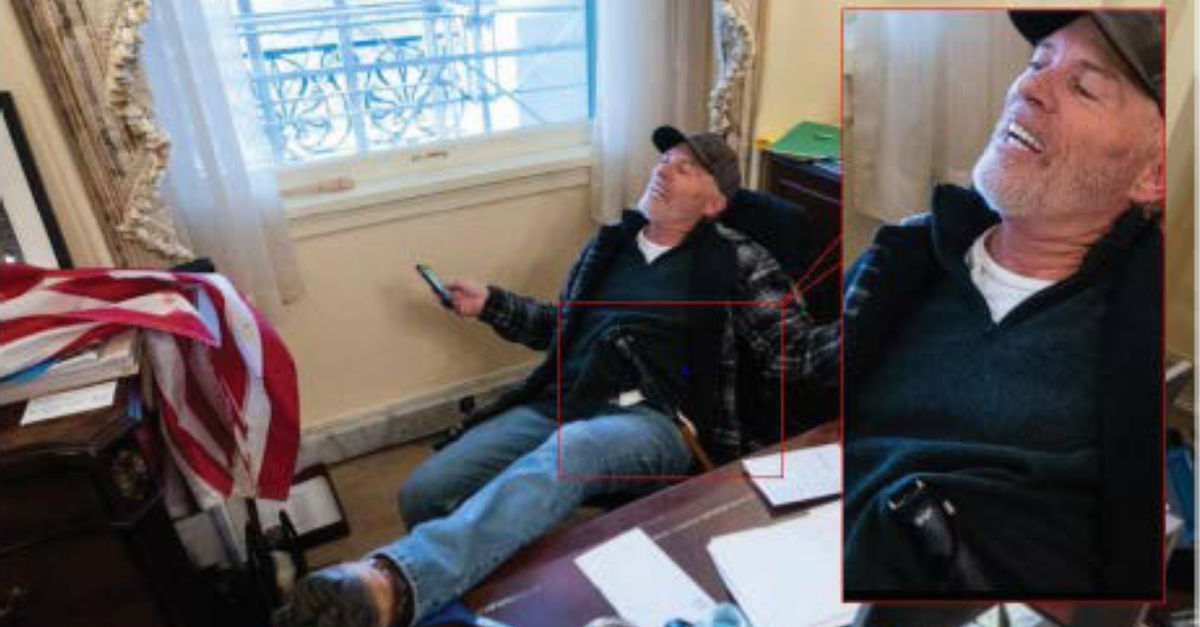
Richard Barnett, who kicked up his feet on a desk in Speaker Pelosi’s office, had a stun gun at the time.
In a thundering ruling at the end of January, the chief federal judge in the nation’s capital repeatedly pronounced the man charged with bringing a stun gun into House Speaker Nancy Pelosi’s office as “brazen, entitled, dangerous,” in explaining why she would keep him behind bars pending trial.
Months later, the U.S. Court of Appeals for the D.C. Circuit heightened the standard for pre-trial detention on Capitol riot cases, and lawyers for Richard “Bigo” Barnett saw an opening to revisit that decision, in a defense brief citing the newfound precedent and a pacifist anthem.
“America is divided,” the brief begins. “Her citizenry is more distrustful of government than ever before. Brother has turned against brother. Fathers have turned against sons. Sisters who once embraced, now see each other as mortal enemies. Pleas for equal treatment under the law are met with accusations of false equivalence. Citizens ask for tolerance with one breath and move to smite those with opposing viewpoints the very next breath. Disinformation abounds.”
The philosophical musings advocate on behalf of a client, Barnett, who was seen with a stun gun stuffed in his pants, a foot on a desk inside Pelosi’s office, and apparently grinning ear to ear, as authorities whisked lawmakers to safety from marauding rioters during the Jan. 6th siege.
Barnett reportedly left a note: “Bigo was here, you bitch.”
On Monday, Barnett’s lawyers sounded a strikingly discordant message to that sentiment, one seemingly pulled from a John Lennon classic.
“Peace is no longer given a chance,” Barnett’s attorney Joseph D. McBride wrote. “Common ground is out of sight. Our Constitution—an inspired document, drafted during times like these, foreseeing times like these—can only save us.”
Since Chief U.S. District Judge Beryl Howell remanded Barnett to jail in late January, the case has been reassigned to U.S. District Judge Christopher Cooper, who will hear the accused rioter’s case for conditional release.
More has changed in the landscape of Barnett’s case from the first detention hearing than the judge.
In late March, the D.C. Circuit gave so-called “Zip Tie Guy” Eric Munchel—who hopped around the Senate chamber carrying tactical restraints—and his mother Lisa Eisenhart another chance for pre-trial release in a ruling reiterating a long established principle.
“In our society, liberty is the norm, and detention before trial is an exception,” the ruling said, citing the 1987 case of U.S. v. Salerno.
Barnett’s lawyers call that D.C. Circuit’s guidance “devastating” to the proposition that their client cannot be released before trial.
“Unlike Munchel, Richard Barnett did not wear battle dress uniform, a tactical vest, or go into the Senate Chamber with zip ties; clearly this is a plus one factor in favor of Barnett,” the defense motion states.
Prosecutors featured that Munchel’s plastic handcuffs could be used to take hostages, though they stopped short of accusing him of intending that.
Barnett’s lawyers distanced their client from the stun gun issue by arguing, in essence, that he never took it out of his pants.
“It should be noted, that as stated above, the allegation is that Barnett’s alleged weapon was ‘on his belt while inside the Capitol,’ which clearly means he did not brandish or use it,” they wrote.
The Washington Post captured Barnett’s thoughts about his identification as a white nationalist, which he left in a pseudonymous post on Facebook.
“I am white. There is no denying that,” Barnett reportedly wrote four days before the Capitol siege. “I am a nationalist. I put my nation first. So that makes me a white nationalist.”
(Screenshot from court records)